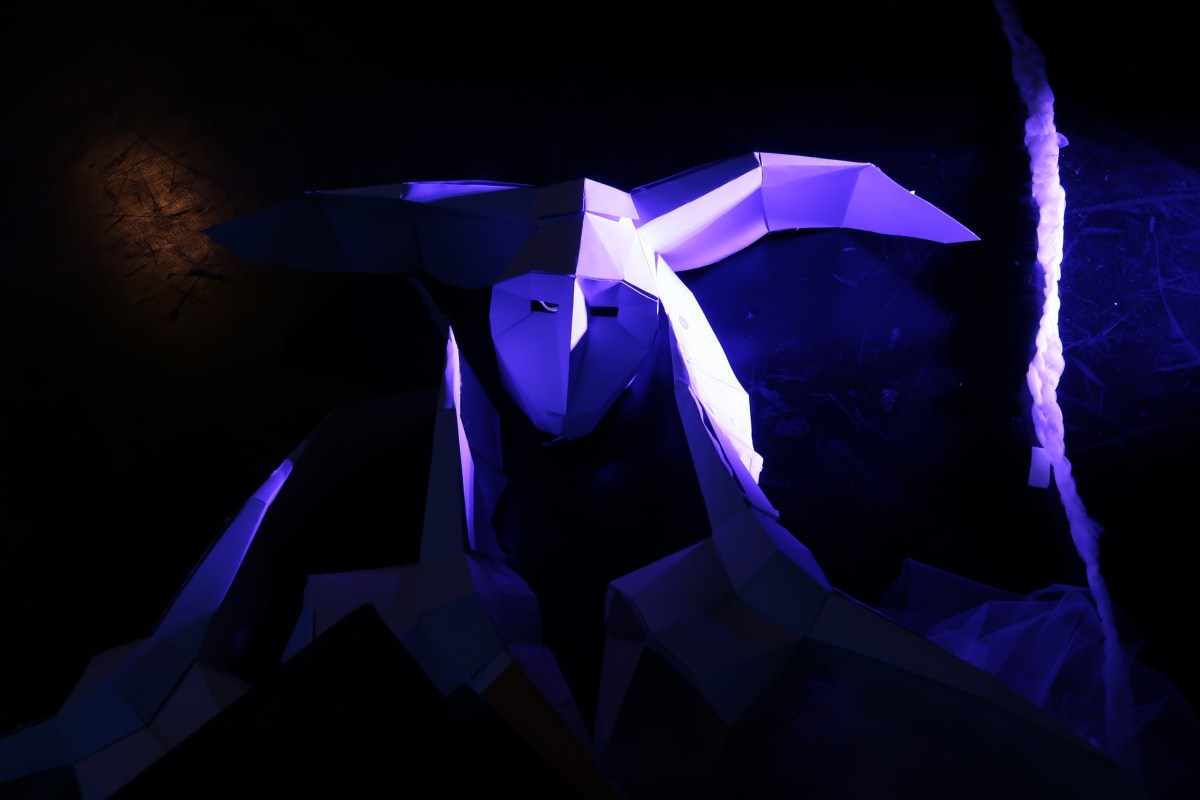Skirting around a set that nearly encroaches the seating, the audience finds a scene of draping and clustered fabric, some shaped by hidden structures. Blurring visible and invisible, rejecting clear spatial delineations, the setting already begins resisting boundaries. Opening with carefully choreographed movements, performers sculpt their bodies into kore and kouros-like shapes, accompanied by striking lighting and sound design. This establishes a powerfully affecting introduction to Monstrous Woman, a reimagining of Phaedra’s story. The emotionally-charged text employs visual metaphors and a defiant reference to Ancient Greek tragedies.
Despite its brevity, the play creates a resistant representation of a woman whose survival was required in defiance of being positioned as a wretched object. The poetic and often rhythmic script is likely to leave the audience contemplative and sharing introspective conversations to decipher the meanings they have drawn.
As founder of Tempest Theatre, Susie Conte applies a feminist lens to this exploration of the socially constructed concepts of femininity. As playwright and lead, Conte is joined by a cast of WAAPA graduates and students in ably exposing the inherent injustice of many myths, concluding with an exodus detailing the demise of supposedly transgressive women. Together, they present many complex factors and relational dynamics that influenced Phaedra’s choices.
The performance conveys an ultimately empowered rejection of stories that consign women to punitive death or tragic endings in penitence or corrections for transgressive acts. Much like the infamous Hays code, the legacy of policing of identity and morality has permeated popular stories. The shaming of Phaedra becomes rooted in how femininity and its performance are moulded by very few permitted roles, such as mother and wife. Women’s desires and persistent sexuality, especially if older and therefore no longer understood as desirable through the male gaze, are considered wanton.
Conte has a commanding presence, even when motionless or delivering hushed dialogue, and skillfully teases out Phaedra’s internalised stigmas amid attempts to communicate her humanity in the face of judgement and damnation. This depiction interrogates how women’s identities and stories are usurped in service of perpetuating constrictive ideas of womanhood.
Read: Theatre review: Queer as Flux
Expanding on tragedy theatre convention, the actors in the chorus provide a multi-dimensional world-building background and characterisations . Braiding expositional chants, song, and dance, they also reflect the shaming public outcry and the turmoil that plagues Phaedra. Despite metaphorical and literal barking of denunciation, the call-and-response interaction shifts from being a remonstrative tale to the story of Phaedra, whose voice is given primacy.
Interestingly, by centring Phaedra’s struggles, the overall staging feels intimate. The rhythmic score and arresting lighting provide a unifying sense of the urgency, power dynamics, evolving pathos, and the expansive power of language to suppress, oppress, or ignite and elevate. Costuming and set pieces interact and parallel the shrouding expected of women’s identities and lives. Women are often confined to private domestic spaces and subjected to the machinations of the men in their lives.
The audience is drawn through a mythic journey that will likely be unfortunately resonant for many, regardless of the version they had previously known. Phaedra’s apparent unrequited love was unbearable. It becomes apparent that the western hegemonic ideas that strongly influence contemporary globalised culture were arguably embedded a long time ago.
Refusing normalised renderings of femininity and womanhood as abject whenever they move beyond what is deemed palatable and acceptable, Monstrous Woman is a provocative allegory. It asks whose truth has been most propagated, for what purposes, and whether fates are determined by capricious gods and goddesses or the disparaging interpretations of disobedient feminine existence.
Monstrous Woman
Tempest Theatre
Subiaco Arts Centre, Western Australia
Director and Writer: Susie Conte
Performers: Susie Conte, Amy Welsh, Elizabeth Offer, Joel Mews, Shelby McKenzie
Producer: Ariane Katscherian
Costume Designer: Jane Tero
Lighting Designer: Katrina Johnston
Stage Manager: Meagan Welsh
Monstrous Woman was performed from 3-6 November 2021




